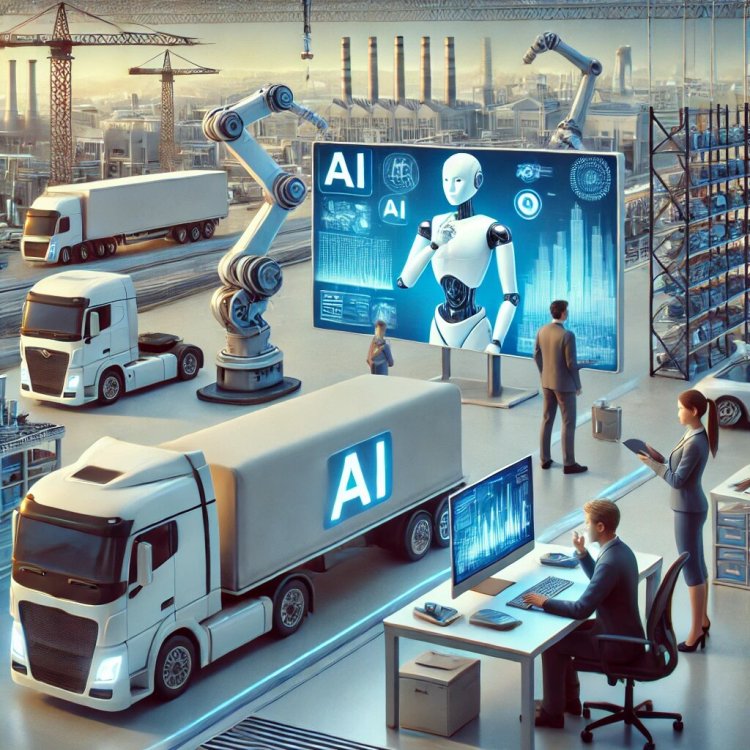What Jobs Will AI Replace?
How AI is reshaping jobs, automating tasks in industries like customer service and healthcare, while creating new opportunities.
Share this Post to earn Money ( Upto ₹100 per 1000 Views )

Artificial Intelligence (AI) is transforming industries worldwide, sparking discussions about its impact on the workforce. While some see AI as an opportunity to improve efficiency, others worry about job displacement. This article explores which roles AI might replace and how these changes could shape the future of employment.
Industries Most Affected by AI
AI is particularly influential in industries where tasks are repetitive and data-driven. For instance, automation in manufacturing has replaced many assembly line jobs over the years. Similarly, administrative roles are increasingly managed by AI tools capable of handling data entry, scheduling, and customer queries.
Customer Service Roles
Customer service has seen significant adoption of AI-driven platforms. Chatbots and virtual assistants can now respond to queries, process complaints, and assist with purchases. These tools reduce costs for companies while providing round-the-clock support. Platforms like Rubii AI exemplify this shift by offering specialized chatbots for creative and interactive uses. Although these systems are effective for standard inquiries, they often struggle with complex problems requiring human empathy and judgment.
Data Entry and Processing
AI excels at handling large volumes of data accurately and quickly. Jobs involving manual data entry, transcription, or document processing are at high risk of being replaced. For example, Optical Character Recognition (OCR) technology can scan and digitize documents in seconds, eliminating the need for human intervention in many cases. Still, roles requiring critical thinking or nuanced analysis remain less affected.
Transportation
Self-driving technology is making strides, particularly in the logistics and transportation industries. Companies like Tesla and Waymo are testing autonomous vehicles for freight and passenger transport. Truck drivers and delivery personnel may find their roles diminishing as these technologies become more reliable. However, the transition is gradual due to regulatory challenges and public safety concerns.
Creative Industries
AI's role in creative industries is evolving. While it might seem unlikely for technology to produce art, music, or literature, AI-generated content is gaining traction. For example, tools can now create visual art or write articles based on prompts. Platforms like Rubii AI provide NSFW AI generators tailored to niche creative needs, emphasizing character-driven narratives and media. Despite these advancements, human creativity remains unparalleled, especially in areas requiring emotional depth or original thought.
Healthcare
In healthcare, AI supports diagnostic processes, patient monitoring, and treatment planning. AI-powered imaging systems can detect anomalies in X-rays or MRIs faster than humans, aiding doctors in making accurate diagnoses. Administrative tasks, such as appointment scheduling or billing, are also increasingly automated. However, direct patient care, which relies heavily on human interaction and empathy, remains the domain of healthcare professionals.
Financial Services
Banks and financial institutions are adopting AI to streamline operations. Automated systems handle fraud detection, risk assessment, and customer service inquiries. Robo-advisors also provide investment advice, making financial planning accessible to a broader audience. Still, roles involving complex financial strategies or personalized advice are less likely to be replaced.
Education and Training
AI is being integrated into education to provide personalized learning experiences. Adaptive learning platforms can identify a student’s strengths and weaknesses, tailoring content accordingly. Virtual tutors and automated grading systems further reduce the need for human intervention in routine tasks. Nevertheless, the mentorship and guidance provided by teachers remain irreplaceable.
The Role of Human Expertise
While AI replaces some jobs, it also creates new opportunities. Many roles require skills that machines cannot replicate, such as emotional intelligence, critical thinking, and interpersonal communication. For instance, AI can assist doctors by analyzing medical data, but only humans can deliver compassionate care and make ethical decisions. Similarly, in creative fields, AI can generate content, but the human touch adds authenticity and uniqueness.
Jobs Less Likely to Be Replaced
Human-Centric Roles
Caregiving, counseling, and other roles involving emotional support are less likely to be automated. These jobs require empathy and understanding—qualities that AI lacks.
Strategic and Leadership Positions
Management and leadership roles demand decision-making and strategic planning. While AI can provide insights, humans are still needed to interpret data and make judgments.
Skilled Trades
Jobs requiring manual dexterity and adaptability, such as plumbing or electrical work, are challenging to automate. These roles often involve unpredictable scenarios where human intuition is essential.
Preparing for the Future
The rise of AI emphasizes the importance of adaptability. Individuals can prepare for these changes by focusing on skills that complement AI rather than compete with it. Creativity, critical thinking, and emotional intelligence are increasingly valuable. Similarly, technical skills like programming, data analysis, and machine learning can open up new career opportunities.
Businesses, too, must adapt by investing in training programs and fostering collaboration between humans and AI tools. For instance, platforms like Rubii AI show how companies can use technology to enhance productivity while catering to niche needs. By embracing such tools strategically, organizations can create a balanced workforce that leverages both human and machine capabilities.
Challenges and Ethical Considerations
Adopting AI raises ethical concerns. Mass job displacement could exacerbate unemployment and income inequality. Governments and organizations must address these challenges by implementing policies that support workers during transitions. Universal basic income, retraining programs, and investment in education are potential solutions to mitigate these issues.
Conclusion
AI is reshaping the job market, replacing roles that involve repetitive tasks or data-driven processes. However, jobs requiring creativity, empathy, and complex decision-making are less likely to be affected.
As AI continues to evolve, it’s essential to strike a balance between automation and human expertise, ensuring a future where technology complements rather than replaces the workforce.

 anmolkaushal
anmolkaushal 















